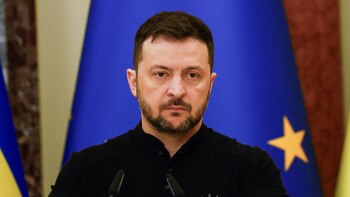
The Presidential Graces Commission of the Ministry of Justice and Human Rights (Minjus) declared the request for pardon for Antauro Humala Tasso inadmissible for failing to comply with assumptions and conditions for this benefit. In a statement, it was detailed that it did not comply with the assumptions of the standard, indicated in Supreme Decree No. 004-2020-JUS.
It was also taken into account that Humala Tasso was convicted of kidnapping, a crime that is legally prohibited, by a rule that establishes the inappropriate pardon and commutation of sentence for those convicted of that offence.
“The file did not meet the assumptions or conditions of a common pardon, for which reason the Presidential Graces Commission declared its file as inappropriate,” he said.
The Presidential Graces Commission evaluated the file of common pardon in ordinary session on February 7 of this year. The file referring to this request was received by the technical secretariat of the commission on August 26, 2021.
Antauro Humala was sentenced in 2009 to 25 years of imprisonment for homicide, kidnapping and rebellion by the so-called “Andahuaylazo”. In 2011, his sentence was reduced to 19 years, following a review of the case by the Supreme Court.
FUJIMORI AND HUMALA
The Minister of Justice and Human Rights, Félix Chero, ruled out a few weeks ago that his administration would “force” a release of Antauro Humala, through a redemption of punishment, and although he stated that it is his defense's right to request this benefit, the evaluation will have to be made in accordance with the principle of legality and respective requirements.
With regard to the pardon of former President Alberto Fujimori, he said that they are waiting for the Constitutional Court to publish the ruling that gave the green light to his release, and from there it is up to the supranational prosecutor to determine the actions to be taken, in the search for the resolution to be evaluated by the Inter-American Court of Human Rights.
PRESIDENTIAL THANKS
After a thorough process of file review, the Government published last Thursday six supreme resolutions granting the presidential grace of commutation of sentence and common pardon to 20 persons deprived of their liberty.
The resolutions are signed by the President of the Republic, Pedro Castillo, as part of the exercise of his presidential authority. They were also signed by the Minister of Justice and Human Rights, Felix Chero Medina.
In this case, presidential graces are granted in the context of Holy Week, in line with government policy on penitentiary matters and in compliance with the announcement made by the Government.
Prior to the measure, the Technical Secretariat of the Presidential Graces Commission of the Ministry of Justice and Human Rights reviewed more than 450 files, and then the Presidential Graces Commission forwarded its recommendation to the Head of State.
Of the group of 20 persons deprived of liberty who receive the benefit, 16 are men and four women, who serve their sentences in the Mujeres de Chorrillos, Jauja, Ancón II, Lurigancho, Huacho, Chiclayo, Chincha, Huancayo and Trujillo males prisons.
In addition, 13 cases correspond to commutation of sentence and seven to common pardon, which comply with the assumptions and conditions established by Supreme Decree 004-2020-JUS: mothers with children in prison and over 60 years of age, and inmates with custodial sentences not exceeding four years.
The prisoners who receive the presidential graces, moreover, are primary prisoners and do not record convictions for other crimes or detention measures or requisitions at the national level; and the crime for which they were sentenced is not expressly prohibited by law, according to information sent by the Judiciary and the National Institute Penitentiary.
Minister Félix Chero said that the 20 presidential graces granted are part of the first stage of a process that will continue in the coming months, focusing on those internal and internal who deserve a presidential grace for humanitarian, elderly and vulnerable reasons; in addition to their participation in prison treatment, their conduct during detention and the degree of resocialization.
He also assured that not all crimes apply to the proposal of presidential graces, such as cases of sexual rape of minors, murder, terrorism, aggravated illicit drug trafficking, extortion, kidnapping, among others of great harm.
KEEP READING:
Últimas Noticias
Debanhi Escobar: they secured the motel where she was found lifeless in a cistern
Members of the Specialized Prosecutor's Office in Nuevo León secured the Nueva Castilla Motel as part of the investigations into the case

The oldest person in the world died at the age of 119
Kane Tanaka lived in Japan. She was born six months earlier than George Orwell, the same year that the Wright brothers first flew, and Marie Curie became the first woman to win a Nobel Prize

Macabre find in CDMX: they left a body bagged and tied in a taxi
The body was left in the back seats of the car. It was covered with black bags and tied with industrial tape
The eagles of America will face Manchester City in a duel of legends. Here are the details
The top Mexican football champion will play a match with Pep Guardiola's squad in the Lone Star Cup

Why is it good to bring dogs out to know the world when they are puppies
A so-called protection against the spread of diseases threatens the integral development of dogs




